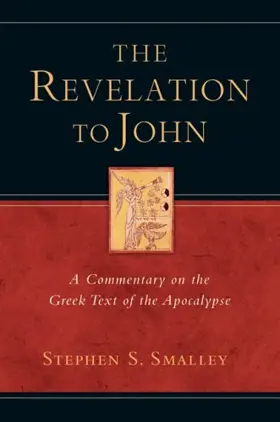

The Revelation to John
Pages
633
Publisher
InterVarsity Press
Published
1/1/2005
ISBN-13
9780830828005
The Revelation to John by Stephen Smalley is a magisterial interpretation of John's Apocalypse as a grand drama, which can only be properly understood in light of John's Gospel and letters and in the context of the Johannine community. As such, it offers the reader a significantly different approach to this enigmatic text than that offered by most contemporary commentaries. Working directly from the Greek text, Smalley offers a masterful analysis of the critical and literary dimensions of the Apocalypse for students and scholars alike. Contents include * an in-depth, critical analysis of the Greek text of Revelation* a wealth of scholarly interaction with other commentaries and interpretations of Revelation* a canonical assessment of Revelation in light of other Johannine texts* a historical understanding of Revelation in the context of the Johannine community* an interpretation of Revelation as cosmic drama Here is a fresh contribution to the scholarly study of this captivating but often perplexing book of the Bible. Smalley demonstrates that the Apocalypse speaks directly to any situation in any age and offers a portrait of God's loving justice that is relevant to our own society. Features & Benefits * Detailed commentary on the Greek text of Revelation* Fresh contribution to scholarly study* Interprets the dense and colorful imagery of Revelation with careful balance* Takes seriously the historical context of the Johannine community* Argues for the literary shape of Revelation as a creative and coherent drama* Demonstrates that the Apocalypse speaks directly to any situation in any age* Offers a portrait of God's loving justice that is relevant to our own society
Collections
This book appears in the following featured collections.
- Ultimate Commentary Collection: NT Technical by John Glynn
- Basic Library Booklist by Detroit Baptist Theological Seminary
- The Pastor’s Bookshelf by Scot McKnight
- Recommended New Testament Commentaries for Evangelical Pastors by Thomas R. Schreiner
Reviews
On most fronts, I think this is possibly the best evangelical commentary on the Greek text. That said, Smalley is slightly behind Beale with respect to the introduction, and I think Smalley's argument for an earlier date (he argues for a date immediately before or after the fall of Jerusalem in 70AD) is not compelling. I think a mid-90s date is better myself. But otherwise, Smalley is outstanding.
Easier to read than Beale's grand work, still very good.
Stephen Smalley’s commentary receives high accolades from various commentators on the commentaries. Carson says it is “a competent piece of work, less daunting than Beale and less tendentious than Aune.” I had to look up “tendentious” and found he means it as a compliment: “expressing or intending to promote a particular cause or point of view, esp. a controversial one.” That makes it sound like quite a helpful work.
[Full Review]
A readable commentary by a life-time scholar on John's writing is S. Smalley
[Full Review]
I include Stephen Smalley's commentary on Revelation in this Top 5 list because I believe his view of the dating of the book is essentially correct. In his commentary, and more fully in his book Thunder and Love, Smalley argues that the book was written in the reign of Vespasian (AD 69-79), just before the fall of Jerusalem to Titus in AD 70. As I explain in my own book, this view of the date of Revelation fits very well with several pieces of evidence, including what John writes in Rev. 17:9-11. I cannot wholeheartedly recommend this commentary as the best, however, because I differ with Smalley's interpretive approach. Despite the fact that his view of the book's date lends itself to a basically preterist view, Smalley follows Beale in taking a modified idealist approach. I agree with Bauckham that it is a very serious mistake to understand the images of Revelation as timeless symbols. It would be the same as if we were to interpret Jeremiah's very specific prophecies about the coming destruction of Judah by Babylon in an idealist manner. John's book is also a prophecy, and like Jeremiah, it too has a specific historical context.
[Full Review]
With the growing list of scholarly commentaries on Revelation in recent years, this offering has the distinction of viewing Revelation as a cosmic drama from the hand of John, the “beloved disciple” of Jesus. Smalley’s analysis of the Greek text builds on his earlier, less-academic introduction to the Apocalypse (Thunder and Love: John’s Revelation and John’s Community [Milton Keynes: Nelson Word, 1994]) and the works of others, notably D. Aune (Revelation [WBC 52 A–C; Nashville: Nelson, 1997–98]) and G. Beale (The Book of Revelation: A Commentary on the Greek Text [Grand Rapids: Eerdmans, 1999]). The apostle John is thought to have written Revelation and played a key role, along with the Johannine community, in the subsequent creation of the Epistles and finally the Fourth Gospel (22). Thus, it may come as little surprise that Smalley’s previous commentaries on the above are generously cross-referenced throughout his newest contribution to the Johannine corpus. After setting forth the parameters of the discussion in a brief introductory section of twenty-two pages, the bulk of the ensuing tome divides into two “acts” with seven “scenes” framed between a prologue and an epilogue. Entitled “Creation, and Salvation through Judgment,” the first act comprises 1:9–11:19. “Salvation through Judgment, and New Creation” comprises 12:1–22:17, the second and final “act.
[Full Review]






